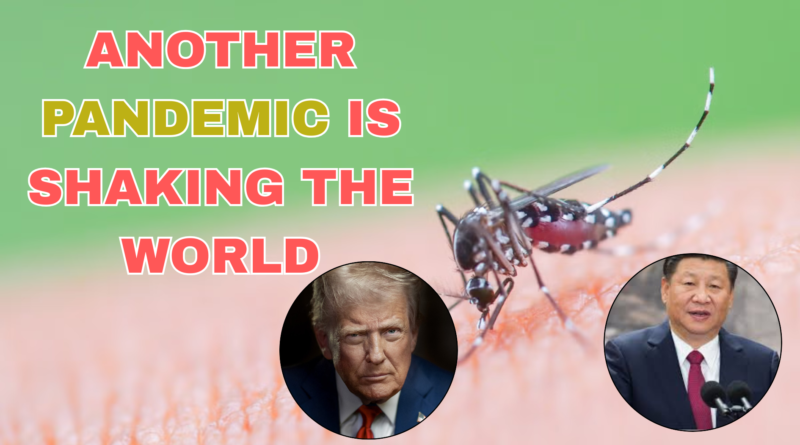ANOTHER PANDEMIC IS SHAKING THE WORLD
Chikungunya, a viral disease spread by mosquitoes, is quickly spreading in many parts of the world. Health officials are becoming increasingly concerned due to the growing number of cases. The situation is especially serious in China, where around 7,000 people have already been affected this year. Because of the global rise in cases, the United States has issued a travel warning to its citizens.
So far in 2025, more than 2.4 lakh (240,000) Chikungunya cases have been reported worldwide. Many of these cases are from Asia, Latin America, and some parts of Africa. Experts believe that rising temperatures, changing weather patterns, and increased travel between countries are helping the disease spread faster than before.
What is Chikungunya?
Chikungunya is a viral disease spread by the bite of infected Aedes mosquitoes, especially Aedes aegypti and Aedes albopictus. These mosquitoes are also known for spreading other illnesses like dengue and Zika.
The disease is not usually fatal, but it can cause severe joint pain, fever, headache, muscle pain, and skin rashes. In some cases, joint pain can last for months or even years.
There is no specific treatment or vaccine for Chikungunya. Doctors usually treat the symptoms with rest, fluids, and painkillers. Most patients recover within a week, but some may experience lingering pain and fatigue.
China Most Affected
In 2025, China has become the worst-affected country, with over 7,000 confirmed cases of Chikungunya. The outbreaks have been reported in several provinces, especially in the warmer southern and coastal areas where mosquitoes thrive.
Local health officials in China are taking several steps to control the spread. These include spraying insecticides, removing standing water from public areas, and urging people to use mosquito repellents and wear long sleeves.
Travel Warning by the US
Due to the rapid increase in cases, the U.S. Centers for Disease Control and Prevention (CDC) has issued a Level 2 travel warning. This means travelers are advised to take extra precautions if they are visiting countries affected by Chikungunya.
The CDC has asked people to:
Use mosquito repellents regularly.
Wear long-sleeved clothing and long pants.
Stay in air-conditioned or screened-in places.
Avoid going outside during early morning and late afternoon when mosquitoes are most active.
The warning covers several countries in Asia, South America, and Africa, where the number of cases is continuing to rise.
Why Are Cases Increasing?
Experts say there are several reasons for the global increase in Chikungunya cases:
Climate Change: Warmer temperatures are helping mosquitoes live longer and breed faster.
Urbanization: Overcrowded cities with poor waste and water management create perfect breeding grounds.
Increased Travel: As more people travel across countries, they unknowingly carry the virus to new places.
Lack of Awareness: Many people don’t know how to protect themselves from mosquito bites, especially in rural areas.
Global Response
The World Health Organization (WHO) has raised concern about the fast spread of the disease and has asked all countries to improve their mosquito control measures.
Several governments are launching public awareness campaigns, distributing mosquito nets, and cleaning up mosquito breeding spots. Some countries are also increasing testing and medical support in affected areas.
Researchers are also working hard to develop a vaccine for Chikungunya. Some vaccines are in the testing stage, but none have been fully approved yet.
How You Can Stay Safe
Whether you are traveling or living in a Chikungunya-affected area, here are some simple tips to protect yourself:
Use mosquito repellents that contain DEET or lemon eucalyptus oil.
Sleep under mosquito nets if windows are not screened.
Keep your surroundings clean and dry.
Remove standing water from flower pots, buckets, and old tires.
Wear clothes that cover most of your body




